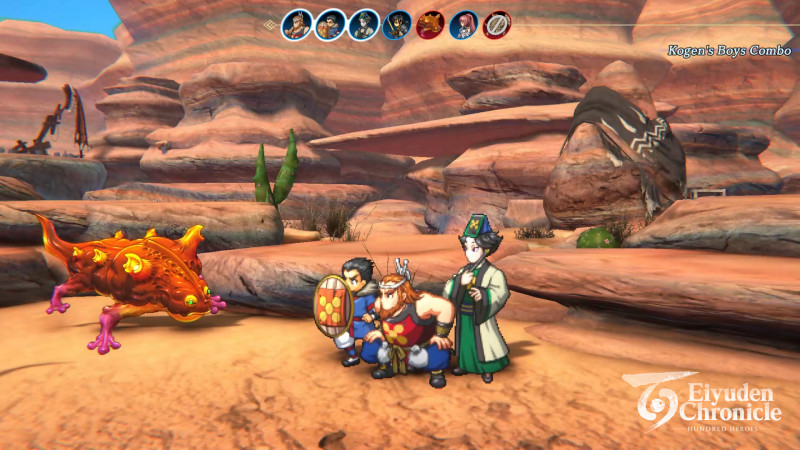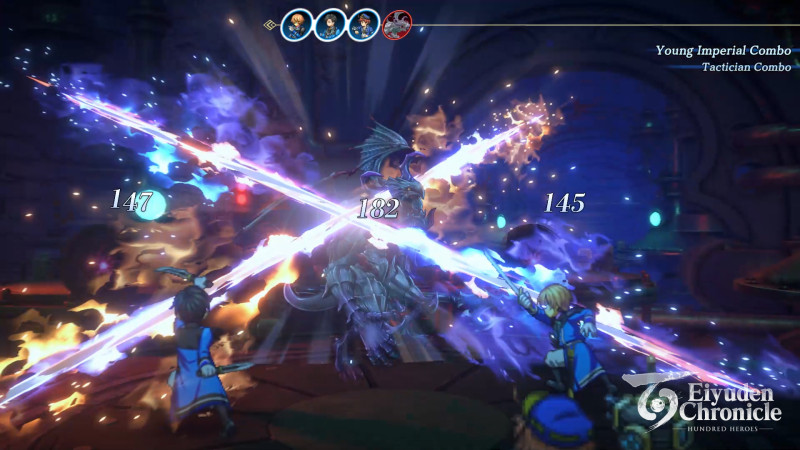“Don’t judge a book by its cover.” A small child dressed as legally distinct Sailor Moon chirped this trite little phrase at me about an hour into Rabbit and Bear’s Suikoden successor Eiyuden Chronicle: Hundred Heroes. I’m not sure when I realized the adage applies to Hundred Heroes itself as much as it did to whatever the child was talking about. It might’ve been after I met a cleric whose vices included violence and foul language; but whenever it was, it encouraged me to overlook the misgivings Hundred Heroes’ poor first impressions raised in me, and there were plenty. Hundred Heroes adheres a bit too closely to outdated design conventions, but the strength of its writing and characters makes up for its short-sightedness.
Rabbit and Bear were serious when they promised a modern Suikoden-like. You play as Nowa, a member of the Eltisweiss Watch mercenary corps devoted to keeping the peace. What starts as a piddling series of errands for nearby villages soon turns into something more serious as Nowa and the Watch get drawn into conflicts that threaten their beliefs and the entire world. Also, like Suikoden, Hundred Heroes divides its time between world exploration, where you pick up quests and new characters, battles, and dungeon crawling, the latter of which is basically an excuse for more battles.

Hundred Heroes also sticks pretty close to Suikoden 2’s combat with a few refreshing expansions. Your team includes up to six active characters with skills you can augment with runes, which grant different abilities and buffs, and each character gets several rune slots that allow for extensive customization. The system is satisfying in itself but comes into its own once you start linking character attacks and forming unique combos.
As the name suggests, recruiting the game’s 100-plus heroes plays a big role. Some join automatically, but the more interesting ones have a quest associated with them that gives a bit more insight into their personality and place in the world. They often play a minor role in the story after that, but their detailed sprite animations and voiced lines still make them feel like part of the story and not an afterthought.
The setup sounds too familiar, but despite writer Yoshitaka Murayama drawing clear inspiration from his previous works, Hundred Heroes never feels derivative and eventually surpasses its source material. It owes much of its personality to that strong cast of brilliantly written characters and a willingness to embrace humor and the ridiculous as a way to cut deeper with its serious themes of autonomy and equity.

They also save Hundred Heroes from itself. Slow traversal, an empty world map, and tedious dungeons make Hundred Heroes more frustrating than it should be, but the promise of a new character vignette or more plot advancement was always enough to keep me pressing forward.
Hundred Heroes expands Suikoden’s base-building feature with new guilds and groups for your party members to form. At a glance, that seems like busywork, and it is. But it also represents something deeper. Your castle is a microcosm of Hundred Heroes’ themes, a small society of people who look, act, and think nothing alike but who respect each other and fight for the right to live freely, without hate.
In battle, a robust AI system lets you program commands and let your party deal with weaker enemies based on how you’ve customized their runes. Boss fights are just complex enough that they demand your full attention, though, thanks in some part to the gimmick feature. These live up to their name, for better and worse, such as making you guess where an enemy will move or forcing you to attack a specific object. They’re a nice change of pace at first but quickly outstay their welcome.
Eiyuden Chronicle: Hundred Heroes is a good reminder of why the RPG genre left some parts of its Golden Age behind. It’s also a testimony to what makes the genre special and the power of good storytelling to move and inspire. Admittedly, rigid adherence to archaic structures makes those first impressions tough to look past, but a creative battle system, extensive party customization, and top-notch writing make up for the retro jank.
